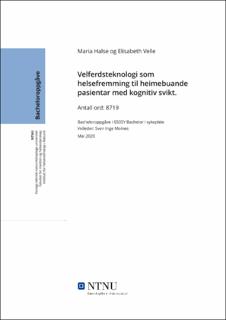Velferdsteknologi som helsefremming til heimebuande pasientar med kognitiv svikt.
Bachelor thesis
Permanent lenke
https://hdl.handle.net/11250/2661211Utgivelsesdato
2020Metadata
Vis full innførselSamlinger
Sammendrag
Samandrag
Hensikt:
Hensikta med studien var å undersøke kva heimebuande pasientar med kognitiv svikt opplever som helsefremmande ved bruk av velferdsteknologi.
Metode:
For å få svar på problemstillinga er det gjennomført ein systematisk litteraturstudie. Det vart gjennomført systematisk søk etter relevant forskingslitteratur, og åtte artiklar som belyser problemstillinga vart inkludert. Studiane i artiklane var kvalitative og desse vart analysert ved bruk av innhaldsanalyse.
Resultat:
Heimebuande pasientar med kognitiv svikt opplevde at velferdsteknologien gjorde at dei følte seg meir sjølvstendige, dei følte auka tryggleik og sikkerheit og dei fekk anledning til å vere meir sosiale, noko som er helsefremmande. Teknologien kunne også bidra til å ikkje fremme helse ved å forstyrre, følast stigmatiserande, at brukarane følte seg overvaka eller at dei følte falsk tryggleik.
Konklusjon:
Studien viser at heimebuande pasientar med kognitiv svikt opplever velferdsteknologi som helsefremmande, men at det er viktig at velferdsteknologien er tilpassa brukaren sine evner og ynskjer for at den skal vere effektiv. Sjukepleiar har her ei viktig rolle i å legge til rette for at implementering og bruk av velferdsteknologi skjer i samarbeid med brukaren, slik at brukaren opplever meistring og kontroll over sin eigen situasjon. Abstract
Purpose:
The purpose of this study was to examine how patients with cognitive failure, living at home, experience welfare technology as a health promotion.
Method:
To reach an answer to the topic question a systematic literature study has beencarried out. Therefore, a systematic search after relevant researchliterature has been conducted, and eight articles highlighting the topic question wasincluded. The studies in the articles were qualitative and were analysed with the useof content analysis.
Results:
Patients with cognitive impairment living at home, experienced that welfare technologymade them feel more independent, they had an increased feeling of safety andsecurity and they had the opportunity to be more social, which promoted health.The technology also contributed to not promote health by disturbing, stigmatize, give a feeling of being watched or a feeling of false security.
Conclusion:
The study shows that patients with cognitive failure living at home experienced welfaretechnology as a health promotion, but the welfare technology must be adapted to thepatients abilities and wishes for it to be effective. Nurses have animportant role to facilitate that implementation and use of welfare technology isproceeding in collaboration with the patient, so that the patient can feel masteringand control over their situation.
